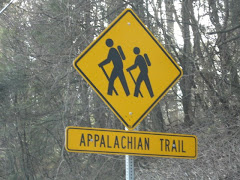Okay, you caught me, that picture wasn't taken in the Northeast! Actually, that's from my trip to Alaska. But I couldn't resist, the first snowfall today reminded me of that vacation.
Before we left I was sure to watch the weather for the area. All reports were a firm 70 degrees, so onward I went. I did not take into account the temperature difference between land and sea, almost 30 degrees! Those who know me, remember that I packed shorts! My credit card company laughed all the way to the bank after I charged a winter wardrobe and rain parka (who knew it rained so much there! okay, yes, we were scheduled to visit the rain forest, but still...). Live and learn as always.
So, as I stayed indoors today watching the snow fall, I began to think of preparing for winter hiking (after Alaska I have learned to prepare for everything!). Here are some simple tips and reminders for when you go out this season:
- Lower your expectations of the hike by 1/2. If you normally hike 6 miles in the summer, expect to only cover 3 miles during the winter.
- Double your time expectations. That trail in the summer may be "a walk in the park" for an hour, but expect it to take up to 2 hours during the snow season.
- Dress in layers, but not cotton! Make sure your outer layer is wind/waterproof.
- Insulated boots with a waterproof exterior are a must.
- In order to keep your feet warm, keep your head covered. How many times have we heard that? Well, it's true.
- Pack extra gloves and liners for when your first pair gets wet. Also, for long hikes, chemical heat packs last hours.
- A "just in case", even for short hikes, is extra socks zip locked in your pack.
- To keep a water bottle from freezing in your pack, tuck it into a wool sock.
- Bring along a thermos of any hot beverage for when you need a quick warm up.
- Consider snacking while you hike versus stopping to eat lunch.
- Add a flavor pack to your water, it will take longer to freeze than just water.
- Careful where you sit! A frozen ground will suck the warmth right out of you.
- Crampons will help you maneuver over snow and ice. Most can be found for about $20.
- Dig out your walking sticks! Aside from helping you keep balance, they can also be used to test ground in front of you when walking.
- Adjust your layers as you're hiking. Take off a layer as you get hot. Too much moisture will make you cold as it evaporates. But, if you stop for a rest, make sure you re-apply the layer before you cool off too much.
- Carry a pack. Take it from me, it's better to let the pack take the impact of a fall than your butt or back!




No comments:
Post a Comment